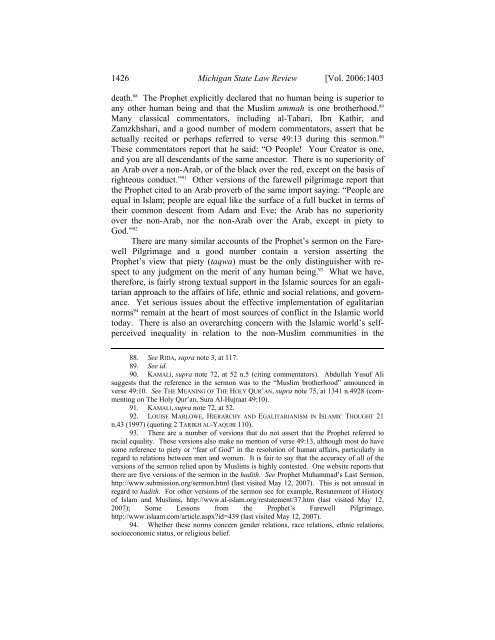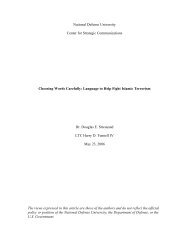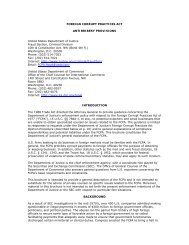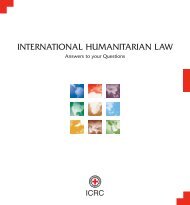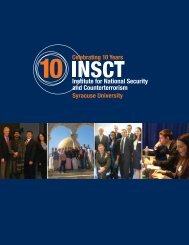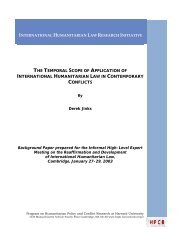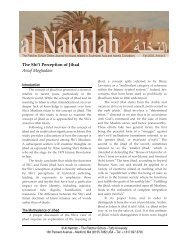1426 Michigan State Law Review [Vol. 2006:1403death. 88 The Prophet explicitly declared that no human being is superior toany other human being and that the Muslim ummah is <strong>on</strong>e brotherhood. 89Many classical commentators, including al-Tabari, Ibn Kathir, andZamzkhshari, and a good number of modern commentators, assert that heactually recited or perhaps referred to verse 49:13 during this serm<strong>on</strong>. 90These commentators report that he said: “O People! Your Creator is <strong>on</strong>e,and you are all descendants of the same ancestor. There is no superiority ofan Arab over a n<strong>on</strong>-Arab, or of the black over the red, except <strong>on</strong> the basis ofrighteous c<strong>on</strong>duct.” 91 Other versi<strong>on</strong>s of the farewell pilgrimage report thatthe Prophet cited to an Arab proverb of the same import saying: “People areequal in Islam; people are equal like the surface of a full bucket in terms oftheir comm<strong>on</strong> descent from Adam and Eve; the Arab has no superiorityover the n<strong>on</strong>-Arab, nor the n<strong>on</strong>-Arab over the Arab, except in piety toGod.” 92There are many similar accounts of the Prophet’s serm<strong>on</strong> <strong>on</strong> the FarewellPilgrimage and a good number c<strong>on</strong>tain a versi<strong>on</strong> asserting theProphet’s view that piety (taqwa) must be the <strong>on</strong>ly distinguisher with respectto any judgment <strong>on</strong> the merit of any human being. 93 What we have,therefore, is fairly str<strong>on</strong>g textual support in the Islamic sources for an egalitarianapproach to the affairs of life, ethnic and social relati<strong>on</strong>s, and governance.Yet serious issues about the effective implementati<strong>on</strong> of egalitariannorms 94 remain at the heart of most sources of c<strong>on</strong>flict in the Islamic worldtoday. There is also an overarching c<strong>on</strong>cern with the Islamic world’s selfperceivedinequality in relati<strong>on</strong> to the n<strong>on</strong>-Muslim communities in the88. See RIDA, supra note 3, at 117.89. See id.90. KAMALI, supra note 72, at 52 n.5 (citing commentators). Abdullah Yusuf Alisuggests that the reference in the serm<strong>on</strong> was to the “Muslim brotherhood” announced inverse 49:10. See THE MEANING OF THE HOLY QUR’AN, supra note 75, at 1341 n.4928 (commenting<strong>on</strong> The Holy Qur’an, Sura Al-Hujraat 49:10).91. KAMALI, supra note 72, at 52.92. LOUISE MARLOWE, HIERARCHY AND EGALITARIANISM IN ISLAMIC THOUGHT 21n.43 (1997) (quoting 2 TARIKH AL-YAQUBI 110).93. There are a number of versi<strong>on</strong>s that do not assert that the Prophet referred toracial equality. These versi<strong>on</strong>s also make no menti<strong>on</strong> of verse 49:13, although most do have<str<strong>on</strong>g>some</str<strong>on</strong>g> reference to piety or “fear of God” in the resoluti<strong>on</strong> of human affairs, particularly inregard to relati<strong>on</strong>s between men and women. It is fair to say that the accuracy of all of theversi<strong>on</strong>s of the serm<strong>on</strong> relied up<strong>on</strong> by Muslims is highly c<strong>on</strong>tested. One website reports thatthere are five versi<strong>on</strong>s of the serm<strong>on</strong> in the hadith. See Prophet Muhammad’s Last Serm<strong>on</strong>,http://www.submissi<strong>on</strong>.org/serm<strong>on</strong>.html (last visited May 12, 2007). This is not unusual inregard to hadith. For other versi<strong>on</strong>s of the serm<strong>on</strong> see for example, Restatement of Historyof Islam and Muslims, http://www.al-islam.org/restatement/37.htm (last visited May 12,2007); Some Less<strong>on</strong>s from the Prophet’s Farewell Pilgrimage,http://www.islaam.com/article.aspx?id=439 (last visited May 12, 2007).94. Whether these norms c<strong>on</strong>cern gender relati<strong>on</strong>s, race relati<strong>on</strong>s, ethnic relati<strong>on</strong>s,socioec<strong>on</strong>omic status, or religious belief.
Special] Post-Enlightenment Qur’anic Hermeneutics 1427West. 95 These c<strong>on</strong>cerns present a need for new and fresh hermeneuticalstudy of c<strong>on</strong>cepti<strong>on</strong>s of equality in Islam and specifically in the Qur’an.How should that study be undertaken?Like the other Abrahamic faiths, Islamic philosophical, political, andjurisprudential c<strong>on</strong>cepti<strong>on</strong>s of human equality have their origins in the revelati<strong>on</strong>aland prophetic texts that comprise the core documents of the religi<strong>on</strong>.While Judaic and Christian sources of our c<strong>on</strong>temporary c<strong>on</strong>cepti<strong>on</strong>sof equality and their histories have been well-studied, 96 the Islamic sources<strong>on</strong> human equality have not been well-examined, and critical studies of thecore Islamic c<strong>on</strong>cepti<strong>on</strong>s of human equality and their histories are actuallyexceedingly rare. 97 There are important and powerful reas<strong>on</strong>s for this ne-95. See, e.g., U.N. DEVELOPMENT PROGRAMME, THE ARAB HUMAN DEVELOPMENTREPORT 2002: CREATING OPPORTUNITIES FOR FUTURE GENERATIONS (2002). This sociologicalstudy, employing several leading Arab social scientists, c<strong>on</strong>cludes that the Arab worldgreatly lags behind all others in three critical areas: political freedom, access to knowledge,and advancement of the status of women. Id. at 43. See also Self-Doomed to Failure,ECONOMIST, July 6, 2002, at 24. It should be noted that the circumstances documented inthese reports are c<strong>on</strong>cerned with inequalities between the Arab world and the West and arenot religi<strong>on</strong>-specific. N<strong>on</strong>etheless, we know that the majority of the Arab world is Muslim.96. See George P. Fletcher, In God’s Image: The Religious Imperative of EqualityUnder Law, 99 COLUM. L. REV. 1608 (1999). See also KIM IAN PARKER, THE BIBLICALPOLITICS OF JOHN LOCKE (2004); JEREMY WALDRON, GOD, LOCKE, AND EQUALITY:CHRISTIAN FOUNDATIONS OF JOHN LOCKE’S POLITICAL THOUGHT (2002); Louis P. Pojman,On Equal Human Worth: A Critique of C<strong>on</strong>temporary Egalitarianism, in EQUALITY:SELECTED READINGS 282 (Louis P. Pojman & Robert Westmoreland eds., 1997).97. I know of no important classical treatises in Islamic law or jurisprudence thattreat, in any depth, the issue of human equality. This may have occurred because before theattenti<strong>on</strong> paid to the subject in Enlightenment texts scholars did not regard the issue as jurisprudentiallyimportant. One of the best examples of this phenomen<strong>on</strong> is the important treatise<strong>on</strong> slavery authored by Ahmed Baba, a fifteenth century African Islamic scholar whowas illegally taken captive and held as a slave by agents of the Sultan of Morocco. He vigorouslyargued that the Sultan’s practice of taking free African Muslims as slaves was illegalunder the Shari’a, but his argument was founded <strong>on</strong> the principle that no free Muslim couldbe enslaved rather than <strong>on</strong> noti<strong>on</strong>s of equality. His treatise is devoid of any developed c<strong>on</strong>cepti<strong>on</strong>of human equality. See Bernard Barbour & Michelle Jacobs, The Mi’raj: A LegalTreatise <strong>on</strong> Slavery by Ahmed Baba, in 1 SLAVES AND SLAVERY IN MUSLIM AFRICA 125 (JohnRalph Willis ed., 1985). There is now great interest in the West in the problem of equality,but this interest still has not implicated Islamic c<strong>on</strong>cepti<strong>on</strong>s. For example, the seminal collecti<strong>on</strong>of studies in Equality c<strong>on</strong>siders the c<strong>on</strong>cepti<strong>on</strong>s of equality found in the Christian,Jewish, and Hindu religious texts and traditi<strong>on</strong>s but it overlooks Islam. See Sanford A. Lakoff,Christianity and Equality, in EQUALITY 115 (J. R<strong>on</strong>ald Pennock & John W. Chapmaneds., 1967); Emanuel Rackman, Judaism and Equality, in EQUALITY 154 (J. R<strong>on</strong>ald Pennock& John W. Chapman eds., 1967). This is very surprising, given that the Muslim world c<strong>on</strong>stitutes<strong>on</strong>e fifth of humanity. CIA - The World Factbook,https://www.cia.gov/cia/publicati<strong>on</strong>s/factbook/geos/xx.html#People (last visited May 12,2007) (reporting Muslim populati<strong>on</strong> as 20.12 percent of world’s populati<strong>on</strong>). This kind ofoversight is fairly typical of studies of the theological and philosophical sources for equalityextant in the West. Professor Fletcher’s essay and the sources he relies up<strong>on</strong> are the rareexcepti<strong>on</strong>s. See Fletcher, supra note 96. Fletcher suggests that the religious sources of the


